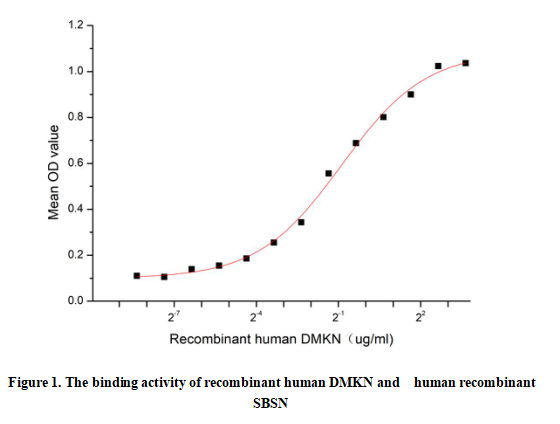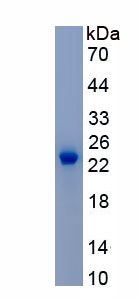Active Dermokine (DMKN) 

Epidermis-specific secreted protein SK30/SK89
- UOM
- FOB US$ 244.00 US$ 610.00 US$ 1,220.00 US$ 3,660.00 US$ 9,150.00
- Quantity
Overview
Properties
- Product No.APN221Hu01
- Organism SpeciesHomo sapiens (Human) Same name, Different species.
- ApplicationsCell culture; Activity Assays.
Research use only - DownloadInstruction Manual
- CategoryCytokine
- Buffer FormulationPBS, pH7.4, containing 0.01% SKL, 5% Trehalose.
- Traits Freeze-dried powder, Purity > 90%
- Isoelectric Point5.6
Sign into your account
Share a new citation as an author
Upload your experimental result
Review

Contact us
Please fill in the blank.
Activity test

Dermokine (DMKN), a 18-kDa secreted protein encoded by the DMKN gene in the epidermal differentiation complex, is primarily expressed in terminally differentiating keratinocytes of the skin epidermis. Functioning as a matricellular protein, DMKN regulates epidermal barrier formation and inflammation by modulating cell adhesion, cytokine signaling , and cornified envelope maturation. It localizes to the granular layer and stratum corneum, where it interacts with structural proteinsand lipids to enhance skin integrity. Dysregulation of DMKN is linked to inflammatory skin disorders and wound healing defects, highlighting its role in epidermal homeostasis and host defense.Besides,Suprabasin (SBSN) has been identified as an interactor of DMKN, thus a functional binding ELISA assay was conducted to detect the interaction of recombinant human DMKN and recombinant human SBSN. Briefly, DMKN was diluted serially in PBS with 0.01% BSA (pH 7.4). Duplicate samples of 100 μl were then transferred to SBSN-coated microtiter wells and incubated for 1h at 37℃. Wells were washed with PBST and incubated for 1h with anti-DMKN pAb, then aspirated and washed 3 times. After incubation with HRP labelled secondary antibody for 1h at 37℃, wells were aspirated and washed 5 times. With the addition of substrate solution, wells were incubated 15-25 minutes at 37℃. Finally, add 50 µL stop solution to the wells and read at 450/630nm immediately. The binding activity of recombinant human DMKN and recombinant human SBSN was shown in Figure 1, the EC50 for this effect is 0.54ug/mL.
Usage
Reconstitute in 10mM PBS (pH7.4) to a concentration of 0.1-1.0 mg/mL. Do not vortex.
Storage
Avoid repeated freeze/thaw cycles. Store at 2-8°C for one month. Aliquot and store at -80°C for 12 months.
Stability
The thermal stability is described by the loss rate. The loss rate was determined by accelerated thermal degradation test, that is, incubate the protein at 37°C for 48h, and no obvious degradation and precipitation were observed. The loss rate is less than 5% within the expiration date under appropriate storage condition.
Increment services
-
 BCA Protein Quantification Kit
BCA Protein Quantification Kit
-
 Molecular Mass Marker for Protein
Molecular Mass Marker for Protein
-
 Monoclonal Antibody Customized Service
Monoclonal Antibody Customized Service
-
 Polyclonal Antibody Customized Service
Polyclonal Antibody Customized Service
-
 Protein Activity Test Experiment Service
Protein Activity Test Experiment Service
-
 Electrophoretic Mobility Shift Assay (EMSA) Experiment Service
Electrophoretic Mobility Shift Assay (EMSA) Experiment Service
-
 Buffer
Buffer
-
 Lentivirus Packaging Experiment Service
Lentivirus Packaging Experiment Service
-
 Adenovirus Packaging Experiment Service
Adenovirus Packaging Experiment Service
-
 Real Time PCR Experimental Service
Real Time PCR Experimental Service
-
 Spike RBD Protein (S-RBD)
Spike RBD Protein (S-RBD)
-
 Protein G
Protein G
-
 Protein A
Protein A







